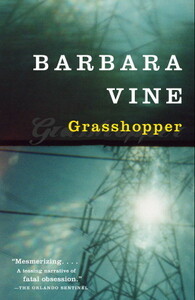Take a photo of a barcode or cover
This seemed a much lengthier read than the actual 400 and something page count would have me believe. It might be that picking it up and putting it down for about three months isn't the best way to read it but it did seem to drag. Altogether too much foreshadowing of the 'if only I'd known then what I know now' type which rather than heightening the suspense leads you to not be surprised by many of the events in the book.
I'm making it sound like I hated it which I didn't. It was a much more interesting, more unputdownable, book in the last hundred pages than it was in the lead up and I enjoyed seeing all the various threads intertwine and play out. Just too much set up for not enough pay off in the end though.
The main spinal theme of the books is scaling heights but the recurring theme of relationships, especially those between parents and children, is more absorbing on the whole. The thing about heights gets your attention but I felt it diverted me from the real matter of the story. Clodagh Brown is the narrator telling the story about eleven years after the events happen when she was 19, mainly when her and her friends lived in Maida Vale and took to gallavanting around the local rooftops. I think it's the looking back narration style that really annoyed me; since she's looking back she can hide things from the reader but it didn't feel artfully enough done. I don't mind being able to guess the ending but there seemed to be too little that I couldn't guess at here.
I love many of Barbara Vine's books but other are just 'eh?' for me. This was one of the second type.
As for things I didn't like so much, the clumsy, heavily used foreshadowing. There was a lot of it, like she didn't trust the readers to keep reading on their own (and it seems from many of the other reviews, many readers didn't anyway.) I'm also not sure why Vine chose to begin the book showing how it ends. We get to see two of the main characters of the book grown up and doing well from the get-go, which, to me, took away a lot of the tension the book could have had.
There were some interesting aspects to the book. The kidnapping story-line kept my attention. And, as I've said before, I did sort of like seeing the main characters mature and grow as the book progressed. I liked the way Vine wrote humans instead of villains and victims. But, in the end, if I'm totally honest, I thought the book was a two-star"okay' and not much more.
Clodagh becomes Silver's girlfriend and an enthusiastic participant in the rooftop adventures. But there are hints of tragedy to come.
Jonny has claimed Liv as his girl--he sees her as his property. Liv, however, adores Wim, who is willing to take her to bed but remains detached. Liv can't bring herself to leave Silver's apartment--she is convinced she will be hunted down by the couple whose children she once miserably looked after. She left their employ abruptly, having gotten into an accident with the children in the car and while over the legal blood alcohol limit. She simply left the car and ran away, but she had with her nearly 2000 pounds that she had amassed--the forgotten change when the parents sent her pick up some household item. Liv is obsessed with the money--convinced that the couple will hunt her down because of it, unwilling to spend it, unable to let it go. This stew of circumstances leads to Jonny mugging Liv's father in an effort to find the money and eventually taking an ax to Wim's leg out of jealousy and frustration. The attack means Wim will never be able to climb the rooftops again, a fate that for him is far worse than death.
Meanwhile the papers are daily reporting on the sensational case of a wealthy couple who have disappeared with their foster son because their bid to adopt him was rejected (on the grounds that the boy is of mixed race and they are both white). Wim spots the fugitives during his rooftop travels, and Silver and Clodagh decide they must help Andrew and Alison and the boy, Jason. They begin by doing shopping and other errands for the couple, and then they hatch a plan to help them all escape to Australia with fake passports. Of course, Silver must go to Jonny for help with the fraudulent documents, which leads to the plan's undoing. When he's picked up for the attack on Wim, Jonny barters what he knows for leniency, and the policy arrive to take Andrew and Alison into custody. Clodagh and Silver attempt to lead the three others across the rooftops to escape, but Alison turns out to be afraid of heights. And it also seems that she has given up hope of getting away with Jason; she falls to her death and Silver narrowly escapes following her.
Clodagh has told Silver the how Daniel fell from the pylon, how she tried to hold on but finally had to let him fall. Silver reciprocates by telling Clodagh his big story--when he was 3-years-old, he disappeared for three days while on holiday with his family. He was returned by a woman who claimed she had found him miles away at a beach cove. But certain items he sees at Alison and Andrew's hideout jog his memory, and certain things Alison says add pieces to the puzzle, until finally it is revealed that Alison snatched Michael. She was in her early twenties and was desperate for a child of her own. Her mother returned Michael, inventing a story of finding him in order to protect her daughter. [This reminded me of Tree of Hands, another Rendell story in which a woman who loses a child finds herself with a kidnapped replacement].





